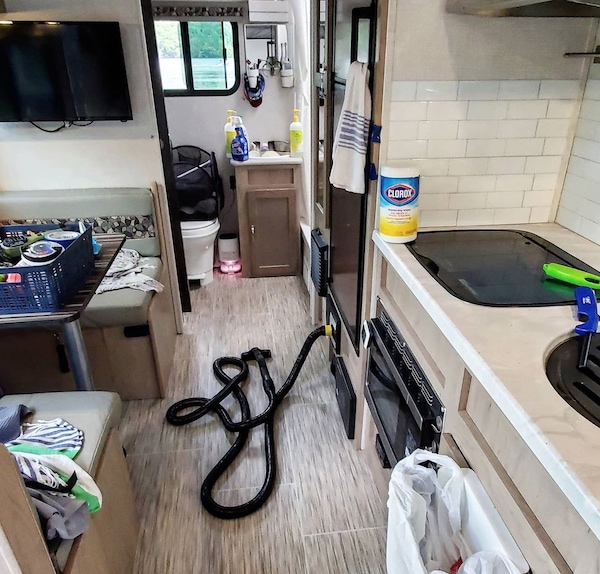How To Store Your RV When Not In Use
If you're like most RVers, you only use your recreational vehicle a few months out of the year. The rest of the time, it just sits in your driveway or garage taking up space.
If you don't take of it when it's not in use it could be problematic further down the line, and even cost you more money in repairs. So, making sure you store it proper when not in use is critical.
In this blog post, we will discuss some tips on how to store your RV when not in use. We will also talk about the different storage options available to you, and what you need to look out for when storing your RV.
RV appliances and electronics can be expensive to replace, so it's important to take proper care of them when storing your RV. Here are some tips to keep in mind:
- Disconnect all electrical appliances and devices from their power sources, and unplug any cords or cables. This will help prevent damage from power surges.
- If your RV has a built-in generator, make sure it is properly serviced and stored before storing your RV. This includes emptying any gasoline left in the generator.
- Be sure to clean all appliances and electronics before storing them. This will help prevent the build-up of dust and dirt, which can cause damage over time.
Clean Your Vehicle Before Storing It
Before you store your RV for a long period of time, there are a few things you need to do, and a thorough clean is one of them. First, you'll need to give the exterior a good wash. This will remove any dirt, dust, or debris that has accumulated on the outside of the RV. Be sure to use a mild soap and avoid harsh chemicals, as these can damage the finish. If possible try to at least rinse the roof of your vehicle. You don't want debris accumulating on your roof for a long time.
Once the exterior is clean, you can move on to the interior. Start by dusting the ceiling. Next, we recommend vacuuming all of the upholstered surfaces, then move on to the floors and other hard surfaces. These areas will need to be washed with soap and water, or disinfectant wipes if that's easiest for you. Be sure to pay attention to nooks and crannies, as these can easily become trapped with dirt and grime (a perfect home for bugs and pests).

Finally, don't forget to empty all of the cabinets and storage areas, you don't want to leave something that a mouse may be attracted to. A thorough cleaning will help prevent your RV from accumulating dust, mold, and mildew, just make sure to cover your RV after you thoroughly clean it.
Protecting Your RV During Storage
RVs are a big investment, and it's important to protect them from the elements as much as you can to prolong their life. RV and camper covers provide an extra layer of protection from the sun, wind, rain, and snow. They help to keep your vehicle clean and dry, which prevents mold and mildew from growing.
Covers also protect against scratches, dents, and other damage that can occur during storage or transportation. In addition, covers can help to keep your RV cooler in the summer and warmer in the winter.
It doesn't matter what time of year or where you store your RV, because preventing unnecessary wear and tear will always prolong the life of your vehicle.
Where to Store an RV
Deciding whether to store your RV on your property or at a storage facility depends on several factors. These include how often you use the RV, the size of your property, and the cost of a storage facility. If you use your RV frequently and have space, it makes sense to keep it on your property so that it's always available when you want to use it. However, if you only use it a few times each year, it will be more convenient to store it at a storage facility.
While storing your RV at a facility will be convenient. RV Storage costs tend to be between $90 - $200 a month. If you use your RV for 3 months of the year your storage costs are going to be between $810 - $1,800 per year. Many owners would rather deal with having their RV on their property than pay $1,800 to store it elsewhere.
An advantage of storing your RV at a facility is the safety aspect. Most facilities have cameras and come with insurance for theft or damage while being stored. This is a nice benefit if you are not at home often.

Do I need to Winterize My RV if I Live in a Cold Area?
If you live in a northern region and don't plan on using your RV for the entire winter, you will have some extra steps to ensure your RV is stored properly. Here are a few tips to help you winterize your RV and keep it in top condition:
First, it's important to protect your RV's plumbing system from freezing temperatures. Start by draining both the black and grey water tanks. Then draining the water heater. Next is the antifreeze.
Before you pour antifreeze down your pipes, you will need to make sure it will bypass the water heater. You don't want antifreeze getting into the heater.
Many RVs have a bypass already installed. Look for the service door on the exterior of the RV that leads to the water heater. The water heater will most likely have an access panel that you can remove from the inside.
You will then need to add the Pink RV specific antifreeze to the system. It is important to use RV antifreeze for your pipes as they're referred to as "GRAS" (Generally Regarded As Safe) by The Food and Drug Administration. Regular antifreeze should not go in pipes that you consume water out of. Once added, make sure the water pressure is off, and open up your faucets.
You will want to make sure your RV's tires are properly inflated and won't flatten during the winter. This may be as simple as pumping air into them, or maybe you will need to get your tires serviced and possibly replaced. It's better to check before you have an issue.
It’s Time to Store Your Vehicle
Maintaining your RV is essential, and people who don't store it proper while they're not using it, do pay later down the line.
Obviously the bigger it is the more problems you may face when it comes to storage, but you must make sure it's at least covered while you're not using it.
From giving it a thorough clean, to winterizng your RV, it all helps prolong the life of your RV. Proper maintenance and storage of your RV are the keys to ensuring its longevity. By following these simple tips, you can keep your RV in great condition for years to come.

Hello, fellow wanderers! I’m Alyssia. Since 2008, my husband and I have called an RV our home, journeying through life one mile at a time. Our nomadic lifestyle has led us to over 70 countries, each with their unique tales that have shaped our own.
I share our stories and insights right here, hoping to inspire and guide you in your own adventures. Expect tips on RV living, our favorite camping spots, breathtaking hiking trails, and the joys and challenges of an ever-changing view from our window. Alongside, you’ll also find practical advice on outdoorsy stuff, designed to equip you for any journey. Join us as we continue to explore the vast, beautiful world on wheels!